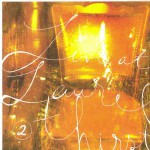 Various Artists
Various Artists
Live At Laurelthirst 2
Laurelthirst Records
For nearly thirty years now, Portland’s Eastside has maintained a tradition of being the heart and soul of the acoustic Folk music scene. From the days of the 9th Street Exit, to the Dublin Pub, to East Ave Tav and Laurelthirst, a loose aggregation of musicians has evolved— something of a musical mutual admiration society and self-help group all rolled into one. An inbred family to be sure.
The Folk scene at Laurelthirst Public House rose up out of the ashes of the Dublin Pub, which migrated over to Beaverton in the late `80s, and now operates with a light Rock/ faux Celtic live music format. Laurelthirst filled the need as home stage for the likes of Ed and the Boats’ and Dan Haley: in his various guises, Billy Kennedy and his array of associates and accomplices; and Neil Gilpin whose own chameleon versatility cannot be overstated.
The original Live At Laurelthirst, released in late 1993, featured fifteen tracks performed by an assortment of musical entites (an abundance of which contained one or more of the aforementioned trio), documenting the mileu of the club at that time. A few of those acts have dropped from sight. One of the contributors, McKinley, has ostensibly moved on to bigger and better things. Haley, Kennedy and Gilpin, as before, repeat in their various roles as both lead and sidemen on LAL2. As in the previous release, the names of bassist Tim Acott and keyboardist/vocalist Mike Danner crop up repeatedly. Several of the bands on the original release have transmuted into something else. From the Crackpots on the first, we have Little Sue on the sequel. From Big Blue Marble we have Sattie Clark and 17 Reasons Why.
In addition, Pete Krebs and his cohorts in Golden Delicious have joined the family. Banjoist Kevin Richey and fiddler Marilee Hord appear on several tracks. Bands such as Doris Daze, Kerosene Dream, Thrillbilly and Hummingfish donate cuts to the second outing, as do newcomers Above The River and The Flatirons.
The resultant recording is perhaps a little rockier and more electrified than its predecessor. Perhaps the pub has overcome somehow the sound limitations afforded by it’s neighborhood proximity. Also, several of the recordings were either culled from other releases or sweetened with a few overdubs. The tracks also seem not to have all been recorded by the same engineer as they were in the first effort, but culled from over a longer period of time. This factor creates a less spontaneous, more uneven, somewhat calculated finished product; but ultimately enjoyable nonetheless.
Golden Delicious kickoff the proceedings with a hyper-Bluegrass jam leading into the Band-like swamptrot of “Cletus.” Richey and Hord provide the pyrotechnics with blazing solos in the breaks, while Krebs and Richey harmonize on the vocals. A rousing number. Wendy Pate lends the Flatirons a dusky, Edie Brickell-tinged voice on “Wildfire,” a windblown tumbleweed of a tune. Jason Okamoto’s savvy lead guitar stylings punch up the arrangement with zesty morsels and bits.
With patented early REM-like exuberance, Thrillbilly sashay through with “Attitude,” an ascerbic little ditty, in which vocalist J. Bowman questions the comportment of an individual outside of his social circle. Mark Dybvig steps in with a sizzling guitar solo, running the gamut from jittery choked-chicken pickin’ to luxurious extended notes, delivering it all in a gritty, chiming fashion. Little Sue’s simple and pretty “Sweetie” builds atop her acoustic guitar and winsome vocal with Hord’s lovely violin, Paul Brainard’s New Orleans trumpet phrasing and possibly Dan Haley on mandolin.
With unerring Pop sensibilities still neatly in place, Doris Daze register “Chainsaw” on the Laurelthirst Richter scale. Maria Callahan and Erin Moreland create a bed of jagged electric guitars under which bassist Erik Merrill bounces a rubbery bassline. Maria and Erin blend for seamless vocals harmonies, which is nothing short of typical for them. As Velvida Underground, Mike Danner is accompanied by some of the “usual suspects” on “Nothing,” a moody number that is equal parts Elvis Costello, Thomas Dolby and Left Banke’s `60s classic “Pretty Ballerina.” A strange and dark number of curious charm.
Dan Haley steps to the vocal mic with the Prairie Dogs on ” Gonna Lay Down My Old Guitar.” Comprised of Acott on bass and Gilpin on fiddle, Pete Krebs on amplified acoustic guitar and Richey on banjo and Haley on mandolin, the Dogs ride Haley’s solid vocal presentaion, while laying down a goodtime vibe. Playing in what sounds like 7/8 time, Humming Fish throw a curve with “Neurotic Undertow.” Jeff Inlay’s crafty electric guitar sounds alternately like a mandolin line and a soulful Funk riff. Mark Buchannan on bass and drummer Andrew McGough lay down a percolating beat, navigating the strange time signature with syncopated polyrhythms, as Deb Talon adds her distinctive vocal touch to an oddly compelling song.
Sattie Clark’s star has certainly risen since her days with Big Blue Marble. Here, with 17 Reasons Why on “The Dark Years,” she gives evidence of the musical maturation she has undergone with a tightly composed arrangement that includes backup vocal support from Nicole Campbell.
“The Letter” by Petty Cash, deservedly throws the spotlight back onto Haley. For nearly twenty years, Dan has been toiling away, constructing idiosyncratic Pop masterpieces; singing his creations with a voice perfectly suited to the idiom, with an ear for vocal harmony that is second to none. All of those elements come into play within this dramatic ballad. Witness the arcanely angelic harmonies over such masterful lines as “But I’ll read your letter/ Long after I’ve folded up/ Coz you write much better/ Than I can ignore you/Someday or never/ I’ll stand in front of you/And recite your letter/And admit that parts of it are true.”
Neil Gilpin’s Belmont Street Octet donates “Sleepy Time Gal” from their 1996 live album recorded at Laurelthirst. And Billy Kennedy’s surreal exposition of Dylan’s “Higthway 61” and Lou Reed’s “Red Joy Stick,” is rendered forth as if Mr. K were crawling with snakes. Speaking in tongues, uttering complete gibberish and chunks of lyrics, cawing like a raven at the side of the road. It’s archetypal Billy K.
In contrasting Live At Laurelthirst with its new sibling, one is immediately struck by the musical sophistication that has developed in the past five years. Where performances on the first record were occasionally a little loose around the edges, here they are rock solid, even on the looser tunes such as Golden Delicious’ “Cletus” and Kerosene Dream’s interpretation of the Country nugget”If You’ve Got The Money, I’ve Got The Time.” It seems the scene is growing up, finely honing the rough edges. It’s become a polished gem, as this recording so nicely captures.
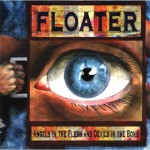 Floater
Floater
Angels In The Flesh…
Elemental Records
Floater’s third full-length release finds the Eugene-based trio exploring their own intrinsically eclectic sound, dispensing with the influences they may have worn more outwardly in past incarnations. Whereas, once upon a time, Floater may have occasionally sounded like one band or another, here they seem to be contemporaries of U2, Led Zepplin, Echo and the Bunnymen, Live and Stone Temple Pilots. Having shed any Grunge trappings, the band has opted for a more emotionally direct approach, at times highly orchestrated (within a Rock context); while fully integrating, as well, their penchant for embroidering found-sounds and curiously bizarre samples into their presentation.
Since the release of Glyph in January of 1996, Floater have obviously spent a lot of time in the studio perfecting their sound and approach. As Glyph was clearly a stylistic leap from Sink, their 1994 innaugural effort, Angels is just as certainly an artistic statement of great power. With each recording, the band is more fluid, more dynamic: nearer to fulfilling the great promise they have always exhibited.
A solitary, shimmering electric guitar figure brings us by a commodius vicus of recirculation back to the beginning of the album, the first version of “Endless.” Acoustic guitars join in, here, as bassist Robert Wyndia wades into his vocal chores with graceful skill. A similarly restrained arrangement decorates “The Watching Song.” Over David Amador’s sparse electric guitar motif, Wyndia wraps his vocal line, calling to mind Ian McCulloch, once and future lead vocalist for Echo and the Bunnymen. Drummer Peter Cornett joins in at the turnatound, propelling the second verse with a hard-hitting strut.
A tom heavy rhythm drives “American Theatric.” Sarod samples drone beneath Amador’s big, meaty guitars in the chorus, as a clipped riff incites tension in the claustrophobic verses. “The Feast” floats upon Wyndia’s ethereal bass intonations in the intro, breaking into coliseum chords for the verses. Amador generously sprinkles his solo with Pageian Middle Eastern flavors, lifting the song above many of the others.
“Minister” is something of a Rock mini-opera, starting off with a Metalish gloomriff, before falling into a gentle minuet, the latticework of Wyndia’s bass supporting limpid acoustic guitar filigrees. A clear winner is the seductive “Medicine Woman.” Beneath a skittering pizzicato guitar and another guitar quivering like electric jello— the rhythm section maintains a Reggae feel through the verses, Paul and Ringo psychedelic in the choruses.
Rumbling with bravado, “Mexican Bus” rides a swaggering beat and Amador’s slashing guitar into the dark whirlpool of the bridge section. Another well-turned number. “The Invitation,” “Golden Head,” “Settling” and “The Last Time” seem to form a suite of similarly tempered songs, disclosing a certain epiphany of bitter realization regarding one with “a golden head and feet of clay.” Swirling in pools and eddys of Andy Summers-like guitar, “The Last Time” inspires Wyndia to a particularly adroit lyric. “With your streetlamp for a soul, I am just one of many insects in your light.”
It’s a three-hundred pound insect skirting the periphery of “Mosquito,” the heavy atmosphere dominated by pulsing bass strings and jagged guitars. “The Possum’s Funeral” is a touching elegy, Wyndia’s piano and keyboard parts lending just the right funereal demeanor. The second take of “Endless” is the Rock version. Backwards guitars trail across a jangling forwards guitar, as Wyndia intones the lyric. The rest of the band soon jumps in with a more uptempo rendition than the first. A way a lone a last a loved a long the solitary shimmering guitar brings the cycle to a close.
Floater demonstrate irrefutable evolution with this record. While it is still not the masterpiece which the band seems likely destined to one day construct, it is still an intelligent and heartfelt piece of work, distinctively unique in its composition.
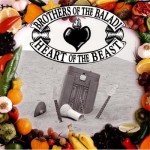 Brothers Of The Baladi
Brothers Of The Baladi
Heart Of The Beast
Self-Produced
Percussionist Michael Beach has been exploring his love for Middle Eastern music for most of his life, including nearly ten years with the Brothers of the Baladi. In that time, Beach has been fortunate enough to surround himself with talents of the highest order, such as Santana drummer Michael Shrieve, who produced Eye On The World, the Brothers’ 1994 release; and bassist/vocalist/keyboardist J. Michael Kearsey, whose local music career spans 25 years with such bands as Upepo and the Rockin’ Razorbacks.
And while the concentration here is primarily on Middle Eastern folk music, this album is something of a World/Pop fusion affair, containing an English folk song, as well as African, Blues and Funk arrangements on a variety of original songs, and a cover of the Yardbirds’ “Over Under Sideways Down” that mirrors the Brothers’ version of the Stones’ “Paint It Black” on Eye. Something for everyone and a darbuka too.
The Yardbirds’ tune, like the Stones’ cover before it, sounds the way the original performers probably wished their recordings would have sounded. Instead of a cheezy electric sitar effect for the signature riff, the Brothers employ Tarik Banzi on the bouzouki, before rockin’ out with a full horn section, and Atillio Panasitti’s growling organ chops. Kearsey adds an off-the-cuff vocal and a surehanded bassline that sits squarely between the two universes of Middle Eastern and Rock.
It’s kind of a splintery fence the Brothers straddle. On the one hand… uh leg, they add Western acoutrements: bass, guitars, keyboards, to traditional Eastern songs; on the other they try to do regular Pop songs, with a little Middle Eastern twist. They are successful in the former with “Bir Demet Yasemen,” a lively Turkish folk song, over which Kearsay lays a Latinesque bass element. “Gamil Gamel” could actually pass for Middle eastern Pop music. “”Tiren Gelir” and “Olmaz Olmaz” stretch a little further.
The train song “Tiren Gelir” benefits from Kearsey’s Reggae-feel bass and guest Dennis Elmer’s muscular drumming, as the baglama saz player, call him Ishmael, wails away like he’s charming every snake in Multnomah county. Ishmael lends “Olmaz Olmaz” character with his work on the hammer dulicmer-like kanoon. Kearsay and guitarist Pete Helfand furnish Spanish flavors to the rich musical stew. Beach throws in a darbuka solo for good measure.
The original Pop tunes, while well-played and competent, don’t fare as favorably. Helfand’s “Love My Love” could easily pass for a re-write of Paul Simon’s “Diamonds In The Souls Of My Shoes” from his Graceland album, replete with Simon’s little-boy-lost vocal style. The Afro/Latin flavors are all in place. The same elements come together on Helfand’s “Marie Don’t Want Me,” with slightly more original results. And his “Pushin’ Shoes” creates a nice groove, but doesn’t really go anywhere.
Keyboardist Geoff George’s “Cut Diamonds” probes a Latin vibe, but is only a pedestrian song, at best. Beach’s “Heart Of The Beast” and “Separation” are fairly solemn odes, with not a lot of vocal personality. Kearsey’s bluesy “Haunted House” works best, featuring Duffy Bishop in a guest lead vocal role; but has no connectioon to World music whatsoever, other than to be in the world and to contain the sparest of Latin percussion.
It’s a confusing hodgepodge of styles we get from the Brothers of the Baladi, who seem unwilling to fully commit to the East or West on this outing. Despite the fact that their strength lies in blending Western themes into Eastern music, the band inexplicably spends half their time trying to graft vague Eastern instrumentation onto ordinary Western Pop songs. In addition, their lack of a true lead vocalist only heightens the fragmented nature of the whole production. These are fine musicians lacking focus and direction, which is a real pity.
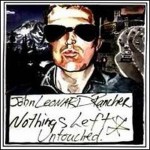 John Leonard Rancher
John Leonard Rancher
Nothing’s Left Untouched
Locals Only Recordings
It’s been a long strange trip for the mercurial Lenny Rancher, who began his career twenty years ago, founding the Malchicks with his brother Billy. In the early `80s, the two feuded periodically and Billy formed the wildly popular Unreal Gods. Lenny struggled in the shadow of his more successful brother, battling alcoholism for years after Billy’s death. But Lenny persevered in conquering his personal demons. He moved on to a lucrative career producing with bassist David Stricker music for television commercials.
In the past several years, Lenny’s attention has been drawn to the systematic denuding of Oregon’s forests (what’s left of them) and wilderness areas (now known as campsites and shooting ranges). The few who were actually around then, can attest to what the Oregon forests looked like in the `50s, `60s and even as late as the `70s. They will not look that way again for hundreds of years, if ever.
Oregonians would be shocked if they knew, if they truly comprehended the monstrous magnitude of the twisted wreckage of clear cuts where stately stands of Douglas fir trees once prospered. To see his home state laid waste in such an insidious fashion made a deep impression on Lenny, inspiring him to become actively involved in various environmental movements. This album addresses the contemporary issues that lie at the heart of all social problems: the battle between the haves versus the have nots.
With Carlton Jackson manning the drum kit and Mel Kubik occasionally sitting in on keyboards, Lenny handles the bass and guitar chores, while singing in an unaffected voice that still somehow contains within it the slightest trace of Bob Marley’s soul. And that makes all the difference.
Marley, John Lennon, Keith Richard and Neil Young come to mind in accessing Lenny’s presentation; but the directness of his delivery is undeniably a Rancher family trait. The material is deceptively simple, sometimes just a couple of acoustic guitars playing a gentle duet, but always lovely and thoughtful— as if the songs always existed somewhere in space and Lenny is merely plucking them from some fruitful song tree. The title track, the touching “On My Way To The Picnic,” the piquant “Plastic” and the sorrowful “Empty Eyes” all fall into that category.
The rockier, uptempo songs percolate nicely, with Lenny phrasing his lyrics like Marley, while not confining the music strictly to Reggae arrangements. “Darkness On My Mind” works a modified Stones chord progression, integrating a couple of electric guitars with acoustic rhythm guitar. “Green World” is a bona fide acoustic Reggae number with a message. “Features” takes a different tack, duckwalking across a whacked-out Chuck Berry riff.
Kubik’s rain-like piano ornaments decorate “Gone Far,” glistening upon the lonely streets of Lenny’s sonic desolation. A very unique song. One of the most brilliant little Pop songs ever fashioned by a local musician, “Fire” holds it’s own against the best love songs ever written by Tom Petty or Bob Dylan. Clever lyrics and a wistful melody that trails beguilingly from line to line, subtly entangle the listener in a complex musical web. A true work of art.
The production is basic, the musicianship at times a bit sloppy. But beneath the surface of this recording beats a heart as strong and as tender as they come. Lenny Rancher has come full circle in his life, from the snotty punk of the early `80s, to the unpredictable misfit of the late `80s, to the clear-headed adult of today. He wears his battle scars well. This is some great work.
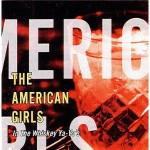 The American Girls
The American Girls
In The Whiskey Ya-Ya’s
Elemental Records
An enterprising Eugene quintet (which of ocurse contains no female members), the Girls weigh in somewhere between the Cure, the Eels and Primitive Radio Gods with a hip sound, full of sophisticated touches and precocious flashes. Eric, Aaron, Scott, Gus and Dan incorporate an array of electric and acoustic guitars with bass and drums, keyboards, and, on every song, a solo trumpet knocking out a melodic introductory theme; along with consistently effective vocals.
The Hip Hop beat and decent DJ work of “Elizabeth” mark the best cut of the lot. Honey-toned guitars bubble lazily beneath a muted trumpet, a smoky atmosphere pervades, as a tenuous voice outlines the lyrical parameters of the setting. A very cool song. Lilting, Tijuana Brassish trumpets herald the arrival of “I Don’t Sleep, I Drink.” A memorable chorus and a strangely overdriven guitar solo distinguish this drowsy ballad as another song of consequence.
Still, one finds it strange that a band with so much apparent talent for composition would rely solely upon the trumpet to convey all instrumental melodic themes, to introduce every song. It doesn’t require a leap of imagination to propose that a guitar or keyboard occasionally play one of those lines the trumpeter seems to continually come up with. Variety is the spice of life, guys… uh girls. (Perhaps Variety would be a good choice for the name of the next Spice Girl!).
Be that as it very well may, our own American Girls generally show enough pluck and cerebral chutzpah to overcoming the brief list of their shortcomings. A little time, a little ingenuity and these boys the American Girls should be good to go.
